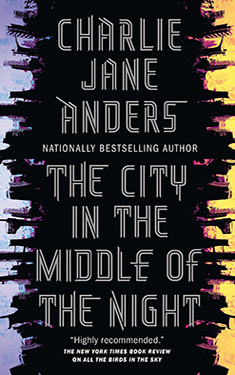Charlie Jane Anders
Completed 3/23/2021, Reviewed 3/23/2021
4 stars
This book was kind of a mixed bag. It felt YA because two of the main characters are in school, but it’s definitely not YA. It was very depressing. There was always a sense of sadness, despair, frustration, or anxiety throughout. The relationships are same-sex, yet there’s no sexual content. At the same time, the author has created a very interesting world with unusual aliens and an imaginative plot. By the end, I was deeply invested in the story and the characters and felt it was well worth the effort to read. I thought it was much more creative than the author’s last book, All the Birds in the Sky. This one didn’t win any awards, but it was nominated for several, including the Hugo.
The action takes place on a planet called January which is tidally locked to its sun, that is, one side always faces its sun. January has been colonized by people from Earth along the twilight part of the planet, between the burning daylight side and the freezing night side. The story follows Sophie as she takes the rap for a friend’s theft, is exiled to the dark side of the planet, and is befriended by an indigenous sentient being, called a crocodile. She’s given a glimpse of their city in the middle of the night side telepathically. She returns to her own city, only to escape with her friend, Bianca, after a failed student uprising. They leave with a caravan of smugglers to the only other city on the planet. There Bianca schemes to take revenge on her home while Sophie continues to feel the call of the crocodiles.
The character development is really good. Sophie experiences PTSD from her arrest and exile. Bianca, who comes from privilege and suffers from guilt for not admitting that she stole the money and for losing her best friend. There is another major character, Mouth, a woman from a now extinct nomadic tribe who runs with the smugglers. She lives with the weight of being the last of her people. There are lots of other minor characters who are also pretty well-developed. Each one felt fleshed out and multi-dimensional.
The relationships are interesting. Both relationships, Sophie and Bianca, and Mouth and Alyssa appear to be queer relationships, but there is no sexual content, not even a romantic kiss. Sophie and Bianca are dorm roommates and Mouth and Alyssa are called bedmates, all in a hetero-normative society that eschews same-sex relationships. So I spent a lot effort on trying to figure out just what their relationships were. They more or less become clear in the end, but it’s still not exactly obvious.
The prose is decent. It’s not too flowery and there is a lot of dialogue. The story is told in alternating chapters of first-person narration by Sophie and third-person narration following Mouth. It worked really well as Sophie and Mouth move in and out of each other’s lives.
The biggest downfall for me about the book was that it was so damned depressing. With Sophie’s severe PTSD from her arrest and exile, and Mouth’s loss of her entire tribe, it pretty much affects the whole tone of the book. I was bummed until the very unexpected ending. But it worked. Even though at times I felt like I was plodding through it, I never felt like they should just get over it. In fact, it made me empathize with Sophie and Mouth.
I give the book four stars out of five. I was thinking three stars until last fifty pages, which really wowed me. The end leaves you hanging a bit, but there’s no sequel planned. It’s not a cliffhanger, it just doesn’t wrap up neatly. I liked that. Even though “Birds” won the Nebula for 2017, I liked this book better.

No comments:
Post a Comment